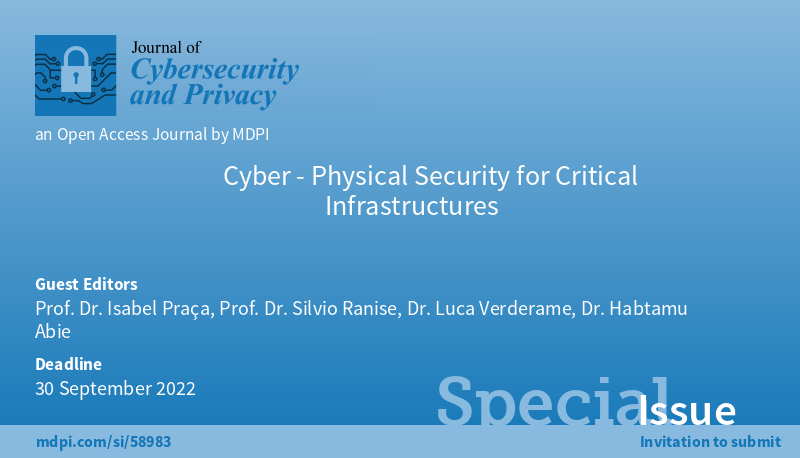Co-located with the 27th European Symposium on Research in Computer Security (ESORICS 2022) - https://esorics2022.compute.dtu.dk/
Copenhagen, Denmark - 26-30, Sep., 2022
Scope & Topics
CPS4CIP 2022 is the third workshop dedicated to cyber-physical security for protecting critical infrastructures which support finance, energy, health, air transport, communication, gas, and water. The secure operation of such critical environments is essential to the security of a nation, its economy, and public’s health and safety. Security incidents in critical infrastructures can directly lead to a violation of users’ safety and privacy, physical damages, significant economic impacts on individuals and companies, and threats to human life, while decreasing trust in institutions and questioning their social value. Because of the increasing interconnection between digital and physical worlds, these infrastructures and services are more critical, sophisticated, and interconnected than ever before. This makes them increasingly vulnerable to attacks, as confirmed by the steady rise of cyber-security incidents, such as phishing or ransomware, but also cyber-physical incidents, such as physical violation of devices or facilities, perpetrated in conjunction with malicious cyber activities.
To address all these challenges, the CPS4CIP workshop has the objective to bring together security researchers and practitioners from the various verticals of critical infrastructures (such as financial, energy, health, air transport, communication, gas and water domains), to rethink cyber-physical security in the light of latest technology developments, e.g., cloud computing, blockchain, big data, AI, Internet of Things (IoT). Specifically, value will be given to contributions focusing on the interplay between the digital and physical aspects of security problems and capable of fostering new, intelligent, collaborative and more dynamic approaches to detect, prevent and mitigate security incidents, such as:
- intelligent monitoring and data collection of security-related information;
- predictive analytics over the collected data based on AI techniques (such as machine learning) which enable the identification of complex attack patterns;
- triggering of preventive and mitigation measures in advance of or shortly after the occurrence of an attack;
- allowing all stakeholders to collaborate in vulnerability assessment, risk analysis, threat identification, threat mitigation, and compliance.
Topics of Interest
CPS4CIP invites submissions that present innovative ideas, proof of concepts, use cases, experience reports, and results from a variety of topics relevant to the security of critical infrastructures and services. Topics of interest include, but are not limited to:
- AI, machine learning for predictive security of critical infrastructures
- Integrated (cyber & physical) security
- Collaborative risk assessment/mitigation in supply chains
- Confronting complex threats and their cascading effects
- Adaptive anomaly detection
- Blockchain solutions for cyber and data security of critical infrastructures
- Risk Assessment and Management
- Identification, assessment, and mitigation of cyber-physical threats
- Automated vulnerability assessment and penetration testing services
- Privacy-preserving data collection and analytics
- Dynamic security knowledge base
- Measuring Security Levels in critical infrastructures
- Adaptive security-related data collection
- AI CCTV analytics
- Security compliance services
- Automation for detection, prevention, and mitigation measures
Important Dates
- Submission deadline: July 24, 2022
- Notification to authors: ~August 31, 2022~ September 7, 2022 (extended)
- Camera-ready versions: September 18, 2022
Special Issue
We are happy to announce that a special issue of the Journal of Cybersecurity and Privacy entitled “Cyber-Physical Security for Critical Infrastructures” is planned as a follow up to the workshop.
Support
The workshop is supported by the projects of the European Cluster for Securing Critical Infrastructures (ECSCI), namely:
- FINSEC
- ANASTACIA
- CyberSANE
- CyberSEAS
- DEFENDER
- EnergyShield
- ENSURESEC
- EU-HYBNET
- FeatureCloud
- IMPETUS
- InfraStress
- PHOENIX
- PRAETORIAN
- PRECINCT
- RESISTO
- SAFECARE
- SATIE
- SealedGRID
- SecureGas
- SmartResilience
- SOTER
- SPHINX
- STOP-IT
- 7SHIELD
And:
- NORCICS (Norwegian Center for Cybersecurity in Critical Sectors) project funded by the Research Council of Norway under the Center for Research-based Innovation (SFI)
- RESTABILISE4.0 (Restabilise and Energy: Specialization of Enabling Technologies for Balancing Energy Infrastructures and Systems) project Confunded by START4.0 - Competence Center for security and optimization of strategic infrastructures
